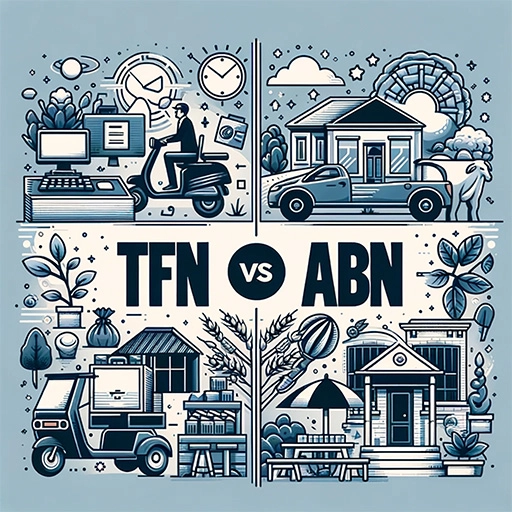Differences Between TFN and ABN Sole Trader in Australia
Mar. 29, 2024
Understanding the key differences between working with a Tax File Number (TFN) and an Australian Business Number (ABN) as a Sole Trader is crucial for those engaged in various sectors like delivery services, farm jobs, and the hospitality industry in Australia.

Register in Just 5 Minutes Today!
Register your ABN nowLast update: Dec. 27, 2024
"Trust ABN Registrar, a registered BAS Agent offering fast, secure, and fully compliant ABN registration services, to deliver an error-free experience that eliminates the common pitfalls many encounter, ensuring you receive expert, step-by-step support throughout the process."
What Are TFN and ABN?
TFN (Tax File Number)
A TFN is a personal reference number in the tax and superannuation systems. It's used primarily by individuals in traditional employment settings.
ABN (Australian Business Number)
An ABN is a unique 11-digit number that allows businesses to interact with the Australian Tax Office (ATO) and other government departments, essential for sole traders.
Working with a TFN
Employment under a TFN involves tax withholdings and superannuation contributions by the employer, offering a layer of financial security.
Operating as an ABN Sole Trader
Working as an ABN sole trader offers independence but comes with responsibilities like managing taxes, invoicing, and reporting to the ATO.
Sector-Specific Implications
Delivery Services like DoorDash and Uber Eats
For delivery services, having an ABN is often necessary, especially when working as an independent contractor, which may also require GST registration.
Farm Jobs, Restaurants, Bars, and Clubs
In sectors like agriculture and hospitality, the choice between TFN and ABN depends on one's role, either as an employee or a self-employed individual.
Running Your Own Business
Starting a business in Australia invariably requires an ABN, highlighting the need for proper registration and tax compliance.
TFN and ABN Sole Trader in Australia
How do I decide between a TFN and an ABN?
Choosing between a TFN and an ABN depends on your employment status, business intentions, and financial responsibilities in Australia.
Can I have both a TFN and an ABN?
Yes, individuals can hold both a TFN and an ABN if they are employed and running a business or working as a sole trader simultaneously.
What are the tax implications of working with an ABN?
ABN holders must manage their tax obligations, including GST if turnover exceeds the threshold, and can deduct business expenses.
Is GST registration mandatory for ABN holders?
GST registration is required for ABN holders if their annual turnover exceeds $75,000, or they provide taxi or limousine travel services, including ride-sharing.
How do I apply for an ABN or TFN?
Applications for both TFN and ABN can be made online through the ATO website, with specific documentation required for each.
Conclusion
Whether opting for a TFN or an ABN as a sole trader in Australia, understanding each option's legal, tax, and operational implications is vital for compliance and success in your professional endeavors.
Read as well our Ultimate Guide to Obtaining an ABN for Australian Businesses.